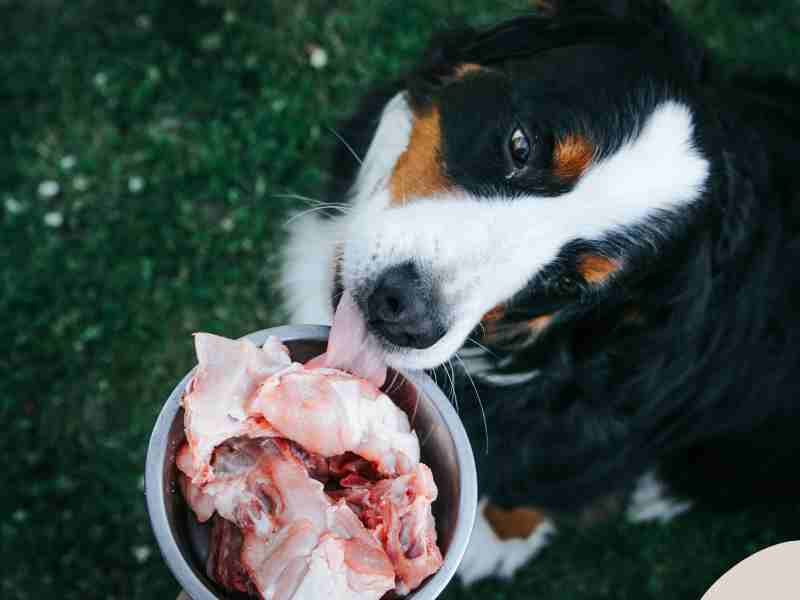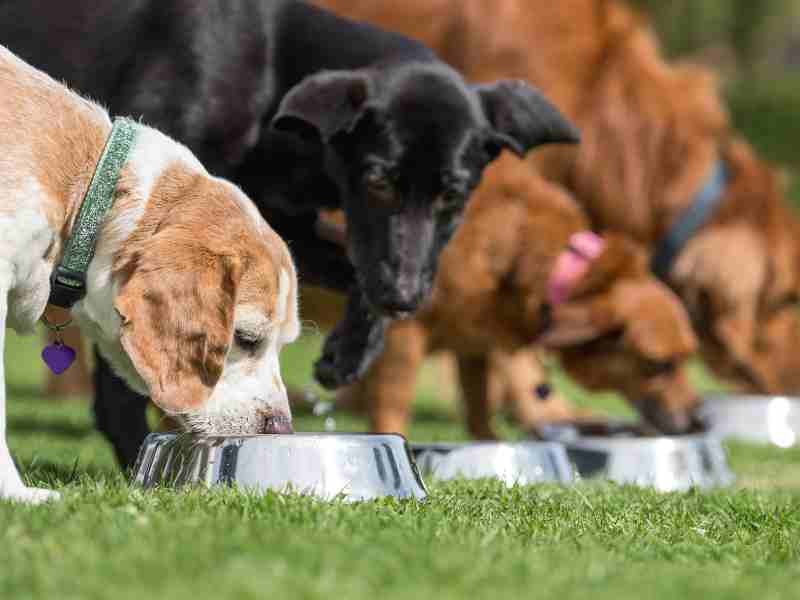What Makes A Balanced Diet For Dogs?
The essential nutrients that foster optimal gut health and overall vitality are at the core of a healthy diet for your dog. Knowing what these nutrients and their roles are can help you make the best choices for your dog’s health from the inside out. No one wants to waste money on dog food that may be popular, but isn’t made from the core components for a balanced dog diet: proteins, carbohydrates, fats, vitamins, and minerals.
Proteins are the building blocks of your dog’s body. They’re essential for growth, repair, and energy. High-quality sources of protein include chicken, beef, fish, and eggs. These ingredients help build muscle, repair tissue, and maintain a healthy coat and skin. For many dog foods, protein comes from chicken, beef, lamb, fish, turkey, pork, venison, and eggs. Sometimes, novel proteins like ostrich, duck, or elk are used for dogs with sensitive stomachs and sensitivities.
Carbohydrates provide a readily available source of energy. While dogs (and humans) don’t require high amounts of carbohydrates, the carbs included in their diet should come from nutritious sources like whole grains, vegetables, and fruits. These carbs should also contribute dietary fiber, which is crucial for healthy digestion. Too many carbohydrates (or too poor a quality of carbohydrates) can mess with your dog’s insulin metabolism, make them gain excessive weight, create inflammation that can lead to dysfunction of their tissue or organs, and disrupt their gut microbiome. Yes, they give energy, but carbs for dogs need to be smart.
Fats are critical for more than just energy and they get a bad rap due to being called ‘fats’. They’re necessary for absorbing vitamins and supporting cell function. Healthy fats, such as those found in fish oil, flaxseed, and chicken fat, offer omega-3 and omega-6 fatty acids, promoting a shiny coat, reducing inflammation, and supporting brain health. They make a difference in a life-long healthy life, provided they’re clean and offer omega benefits.
Vitamins and Minerals play tons of different roles in a dog’s body, from supporting bone health to immune system support. A well-rounded and balanced dog diet will naturally include these essential nutrients. Things like calcium and phosphorus support bone health, while vitamins A, C, and E help with vision, skin health, and cellular function, respectively.
All of those nutrients have a specific role in promoting good gut health and ensuring the proper absorption of food. You can spend all the money in the world on dog food, but if your dog’s not absorbing the nutrients optimally, you’re really wasting money and tearing away at the foundation for their good health. Optimal nutrient absorption is always the goal of a balanced diet for dogs.
The Role Of Fiber In Dog Food: From Weight Management To Cancer Risk Reduction

Fiber plays a critical role in a dog’s balanced diet, offering many health benefits essential for maintaining a healthy digestive system. Most dog foods contain fiber, but not all fiber sources are created equally (some dog foods use cheap sources like cellulose), and a premium blend of soluble and insoluble fiber can make a world of difference. Fibers can be categorized into soluble and insoluble, and both are necessary for different functions in a dog’s body.
Soluble fiber is the type that dissolves in water and forms a gel-like substance in your dog’s digestive tract. This gel-like fiber helps to slow down their digestion process so that nutrients can be absorbed appropriately. It’s also helpful for controlling blood sugar levels because it can help prevent rapid spikes after meals. Soluble fibers also aid in lowering fat absorption and managing cholesterol levels in the bloodstream. Moreover, they serve as prebiotics, feeding the beneficial bacteria in the gut microbiome, which is vital for a healthy digestive system.
Insoluble fiber, on the other hand, does not dissolve in water. Instead, it adds bulk to your dog’s stool and can help to speed up the passage of food and waste through the gut. This type of fiber is excellent for preventing constipation, ensuring that your dog’s digestive system is moving and functioning properly.
Together, soluble and insoluble fibers act as sort of modulators for your dog’s system. If your dog is suffering from loose or runny poop, fiber can help bulk and firm it up. If your dog suffers from constipation, it can slow it down and allow more water to be absorbed to make it go through the system easier.
Fiber is KEY for helping with weight management in dogs, as it can help them feel fuller and less hungry, helping them not to overeat.
When we created Bernie’s Perfect Poop, our focus was on incorporating both types of fibers to provide a balanced approach to gut health. We chose the following:
- Miscanthus Grass: A clean, eco-friendly choice rich in insoluble fiber to add bulk to the diet and help food move through the digestive system. Many dog food products are turning to Miscanthus for these reasons.
- Dried Pumpkin: A natural and gentle source that provides a mix of soluble and insoluble fibers, supporting both bowel regularity and healthy digestion. Pumpkin has long been a go-to from vets for helping regulate bowel health.
- Flaxseed: Contains high levels of soluble fiber, which can help maintain gut flora balance and improve your dog’s stool quality.
Prebiotics And Probiotics In Balanced Diets For Dogs
Even if your dog is getting the best and most balanced diet, if the microbe balance is off, they won’t be able to make the most of it. Probiotics and prebiotics are also integral to maintaining a healthy gut microbiome in dogs, much like they are in humans. Probiotics are live microorganisms that offer help in balancing your dog’s microbiome. They naturally live in your dog’s gut and battle pathogens, viruses, and other harmful bacteria, which doesn’t just help their digestion and nutrient absorption, but also helps immune function and overall health. Supplementing in adequate amounts can ensure this balance and the benefits.
Prebiotics, on the other hand, are non-digestible fibers that feed the beneficial bacteria (probiotics) in the gut. They also help maintain the balance and diversity of gut intestinal bacteria and help promote a healthy gut microbiome. Prebiotics are essentially the food that allows probiotics to thrive.
When we were looking at the best probiotics for our dogs, we looked at Bacillus coagulans and Bacillus subtilis strains because they were both known for their health benefits for dogs. The thing about any probiotics you supplement is that they need to survive your dog’s harsh stomach acid. They need to be able to form spores and populate your dog’s gut for a thriving microbiome. Not every probiotic for dogs on the market can do this, and we didn’t want to waste money on those that didn’t.
Bacillus coagulans is a particularly hardy probiotic that can survive stomach acid. It gets to the gut and thrives. It’s known for its role in improving stool quality and helping digestion. It has also been linked to enhancing the immune response in dogs. Studies have found that Bacillus coagulans can help reduce inflammation and may even positively affect dogs experiencing digestive problems like diarrhea.
Bacillus subtilis, another probiotic strain used in our products, is known for its ability to fight off harmful pathogens in the gut. It helps promote a healthy gut environment, encouraging the growth of good bacteria, and has also been scientifically associated with improved digestive health in dogs. It’s a cool probiotic that can stimulate your dog’s immune system and may also produce enzymes that help with digestion.
When it comes to choosing prebiotics, we rely on inulin and Xylooligosaccharides (XOS). Inulin is a soluble fiber that ferments in the colon, and that is what feeds and supports the growth of beneficial bacteria. It’s been linked to improved absorption of calcium and magnesium and helps regulate bowel functions. Xylooligosaccharides from the Miscanthus are the up-and-coming heroes of gut health because they powerfully promote the growth of beneficial gut bacteria for dogs.
Including powerful and effective prebiotics and probiotics in your dog’s balanced diet is essential for their overall health and well-being.
How Are A Balanced Diet And Dog Gut Health Related?
Gut health, a critical aspect of your dog’s overall well-being, is more than just a buzzword, although it’s often used as one. Still, it really is a complex system that ensures your pet is not just eating but truly benefiting from their diet. How are a balanced dog diet and dog gut health related?
The dog microbiome is a community of beneficial bacteria that live in the dog’s gut, playing a pivotal role in breaking down food, fighting off pathogens, and even regulating their mood! In your dog’s microbiome, everything has a purpose–whether it’s growing into a thriving flora or fighting off pathogens and viruses, the goal of your dog’s gut is to be balanced and functional.
Digestion is the physical and chemical breakdown of food. It’s the process that transforms your dog’s meals into the nutrients their body can use. It starts when they put food in their mouth and ends when they’ve had the perfect poop. Proper digestion means that food is efficiently broken down, which allows for the next and most critical part of balanced diets: absorption.
Nutrient absorption is the grand finale in the digestive process, where the nutrients from digested food are absorbed into the bloodstream. This is where the balanced diet pays off, as optimal absorption ensures your dog gets the full spectrum of nutrients they need to maintain their energy, health, and happiness. But it can only be optimal absorption if your dog’s gut is healthy.
So, how can you tell if your dog’s gut health is on the right track? A healthy gut often translates to a dog with good energy levels, a shiny coat, and regular, perfect poop. Signs of an unhealthy gut might include frequent diarrhea or constipation, vomiting, lethargy, or even unexplained weight loss. If you believe your dog is suffering from an unhealthy gut, they’re likely not getting the benefits of a balanced diet, and this means they’re not as healthy as they could be.
The Best For Dogs: Bernie’s Perfect Poop

We started Bernie’s Best because we wanted the best for our own dogs, Bernie and Lady. We knew that the food we gave them didn’t matter if their gut health wasn’t as it should be. We didn’t want to waste money on dog food they couldn’t get the full benefits from, so we focused on their gut health to help them from the inside out. That’s how Bernie’s Perfect Poop was born.
Dogs are more than just pets—they’re part of the family. What started as taking care of our own dogs by supporting a balanced diet and healthy gut has turned into a product line that helps do that for dogs everywhere. We make products designed to complement your dog’s diet, and to make sure they’re getting the most of everything they need for the best gut health.
When you give your dog Bernie’s Perfect Poop with each meal, you’re making sure that they’re able to absorb every bit of the balanced diet you feed. For us, it’s not just about feeding, though… it’s about nourishing, caring, and making sure all dogs live their best lives, just as they deserve.





